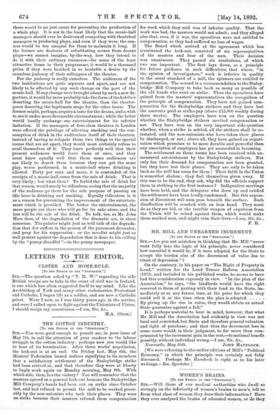THE COTTON INDUSTRY.
[To THE EDITOR OF THE "SPECTATOR."]
SIR,—You were good enough to permit me, in your issue of May 7th, to call the attention of your readers to the labour struggle in the cotton industry : perhaps now you would like to hear of its termination. After three weeks' negotiation, the lock-out is at an end. On Friday last, May 6th, the Masters' Federation issued notices signifying to its members that a satisfactory settlement of the Staleybridge strike had been arrived at, and that therefore they were at liberty to begin work again on Monday morning, May 9th. With which side, then, lies the victory ? You will remember that the masters agreed on a general lock-out because the Staleybridge Mill Company's hands had been out on strike since October last, and had refused to permit the mill to be worked peace-, ably by the non-unionists who took their places. They were on strike because their masters refused them compensation
for work which they said was of inferior quality. That the work was bad, the masters would not admit; and they alleged also that, even if it was, the operatives were not entitled to compensation, as they had suffered no loss of wages. The Board which arrived at the agreement which has terminated the lock-out, consisted of six representatives of the masters and four of the men. Their decision was unanimous. They passed six resolutions, of which two are important. The first lays down, as a principle for future guidance in such difficulties, that where, "in the opinion of investigators," work is inferior in quality to the usual standard of a mill, the spinners are entitled to compensation. The second is a recommendation to the Staley- bridge Mill Company to take back as many as possible of the old hands who went on strike. Thus the operatives have gained from the masters' representatives the recognition of the principle of compensation. They have not gained com- pensation for the Staleybridge strikers, and they have lost the amounts paid as strike-pay (above 215,000 weekly during three weeks). The employers have won on the question whether the Staleybridge strikers merited compensation or not. They have won on the very important side-question whether, when a strike is settled, all the strikers shall be re- instated, and the non-unionists who have taken their places. bedischarged, or not ; above all, they have gained an organi- sation which promises to be more durable and powerful than any association of employers has yet succeeded in becoming.
The settlement on these terms has been received with un- measured astonishment by the Staleybridge strikers. Not only has their demand for compensation not been granted, but they have lost their places. They are only to be taken back as the mill has room for them ! Their faith in the Union is somewhat shaken ; they feel themselves given away. If this was to be the end, they ask, why did the officials support. them in striking in the first instance ? Indignation meetings have been held, and the delegates who drew up and ratified the settlement have been loudly condemned. But this expres- sion of discontent will soon pass beneath the surface. Such disaffection will be crushed with an iron hand. They must do as they are bid, or the terrible weapon of expulsion from the Union will be raised against them, which would make them marked men, and might ruin their lives.—I am, Sir, &c.,.
F. B.






































 Previous page
Previous page